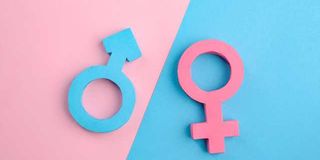Inside Kenya’s five-year plan to enhance gender equality

Gender equality symbol.
What you need to know:
- The plan, among others, seeks to reduce gender disparity in public and private spheres, prevalence of gender-based violence, female genital mutilation and other harmful cultural practices.
- It also aims to enhance opportunities and capacity for women and other vulnerable groups to participate in national development and reinforce evidence-based decision-making on gender issues.
The government has launched a five-year plan to enhance gender equality.
The State Department of Gender and Affirmative Action last week launched the 2023–27 plan that seeks to undertake the constitutional mandate of advancing gender equality, non-discrimination and empowerment of all women and girls.
The plan, among others, seeks to reduce gender disparity in public and private spheres, prevalence of gender-based violence, female genital mutilation and other harmful cultural practices.
It also aims to enhance opportunities and capacity for women and other vulnerable groups to participate in national development and reinforce evidence-based decision-making on gender issues.
Gender Cabinet Secretary Aisha Jumwa said the plan is aligned with Vision 2030 and its fourth medium-term plan under the social sector pillar.
Ms Jumwa added that at the core of the strategic plan is the bottom-up economic transformation agenda (Beta) for inclusive growth.
“The gender sector will play a crucial role to ensure achievement of aspiration and various interventions in Kenya Vision 2030.The state department commits to working towards the achievement of a society free from gender discrimination and violence,” she said.
The launch is in fulfilment of the Public Service Commission (Performance Management Act) Regulations 2021, which stipulated that every public institution should develop its strategic plan in a participatory manner.
According to Chapter Four of the Kenyan Constitution, on the Bill of Rights, every person is equal before the law and has the rights to equal protection and benefit of the law.
Women and men have the right to equal treatment, including the right to equal opportunities in political, economic, cultural and social spheres.
The law prohibits both direct and indirect discrimination. The state is expected to take legislative and other measures, including affirmative action programmes and policies designed to redress any disadvantage suffered by individuals or groups because of past discrimination.
Kenya has in particular been lagging behind in the area of women participation in political leadership.
According to the International Institute for Democracy and Electoral Assistance, Kenya still lags behind in the representation of women at both houses, with only 23 per cent compared to Rwanda, which has the highest percentage score of 61 per cent.
Other East African countries include Burundi with a percentage score of 38, Tanzania with 37 and Uganda with 35.
Interestingly, the youngest nation in Africa and the newest member to the East African Community–South Sudan–performs better than Kenya with 28 per cent.
However, it’s not all gloomy in some areas as Kenya has nearly achieved gender parity in education at all levels, ensuring inclusive, quality education for all by 2030.
The enactment of the Constitution and the Basic Education Act of 2013 emphasises the right to education for all children, regardless of gender.
This legislation also stresses the elimination of gender discrimination in schools. Over the recent past, Kenya has made significant strides towards achieving gender parity in education on a national scale.





